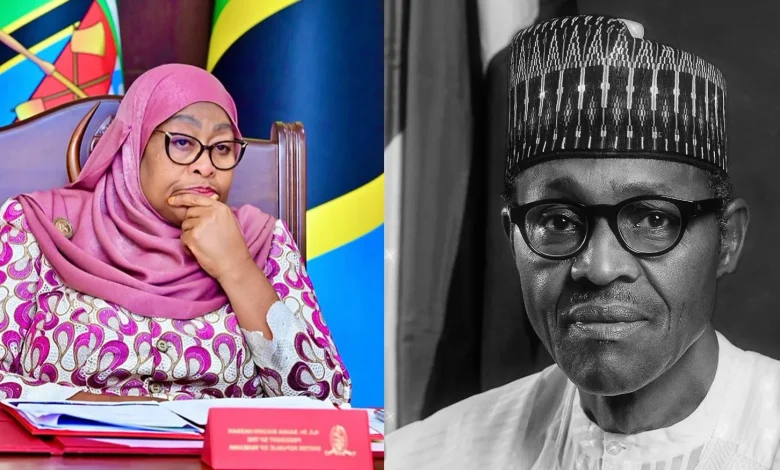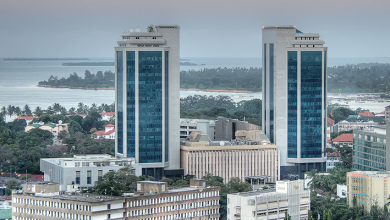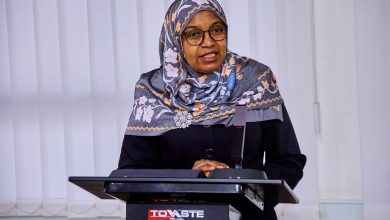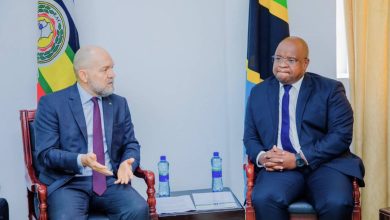Samia mourns former Nigerian leader Buhari

DAR ES SALAAM: PRESIDENT Samia Suluhu Hassan has extended her heartfelt condolences to the government and nation of the Federal Republic of Nigeria following the passing of former President Muhammadu Buhari.
Former President Buhari, passed away at 82 on Sunday in a London hospital.
“I am deeply saddened to learn of the passing of the former President of the Federal Republic of Nigeria, His Excellency Muhammadu Buhari,” said President Samia in a condolence message shared on her official social media platforms.
She extended heartfelt sympathy on behalf of the government and the people of the United Republic of Tanzania to President Bola Ahmed Tinubu, Buhari’s family and the Nigerian nation.
“On behalf of the government and the people of the United Republic of Tanzania, I convey our heartfelt condolences to His Excellency Bola Ahmed Tinubu, President of the Federal Republic of Nigeria, President Buhari’s family and the people of Nigeria,” she wrote.
Buhari, a former military general who led Nigeria from 2015 to 2023, died in London at around 4:30 pm after a prolonged illness, according to a statement from Nigeria’s Presidential Press Office.
In his tribute, President Tinubu described Buhari as “a patriot, a soldier and a statesman with a deep commitment to the unity and progress of his country.”
“He stood firm through the most turbulent times, leading with quiet strength, profound integrity and an unshakable belief in Nigeria’s potential,” Tinubu said.
He praised Buhari’s firm stance on discipline in public service, his anti-corruption drive and his dedication to national interest over personal gain.
President Tinubu has directed Vice-President Kashim Shettima to travel to the United Kingdom to accompany Buhari’s remains back to Nigeria for a state funeral.
Born in December 1942 in Daura, Katsina State, Buhari began his military career in Kaduna and later received advanced training in the United Kingdom, India and the United States.
ALSO READ: Samia mourns former Zambian President Lungu
He rose to national prominence in 1975 following a military coup that deposed then-President Yakubu Gowon.
He was later appointed military governor of Borno State, a region that would eventually become a focal point in the Boko Haram insurgency.
In 1983, Buhari led another coup that ousted President Shehu Shagari.
His time as military ruler (1983– 1985) was marked by strict discipline, an aggressive anti-corruption campaign, and a no-nonsense approach to governance.
However, his regime was toppled in a palace coup just two years later.
Decades after his military rule, Buhari re-emerged on the political scene as a self-proclaimed “reformed democrat.” After three unsuccessful attempts, he won the presidency in 2015 and was re-elected in 2019.
His campaigns centred on fighting corruption, strengthening security and revitalising the economy.
His presidency earned praise for confronting Boko Haram and initiating anticorruption reforms.
However, critics pointed to flaws in governance, including a six-month delay in forming his cabinet and resistance to devaluing the naira during a period of economic downturn, which contributed to investor anxiety and a recession.
In one of his final global appearances at the 2022 United Nations General Assembly, Buhari warned against constitutional manipulation by leaders seeking to extend their time in power.
“The corrosive effect of leaders who extend term limits to cling to power is one of the biggest threats to democracy today,” he cautioned.
In 2023, Buhari endorsed Bola Ahmed Tinubu as his successor, declaring him “the best person for the job.” Muhammadu Buhari is survived by his wife, Aisha Buhari, and ten children.
As Nigeria prepares for a state burial, tributes continue to pour in from across Africa and beyond, honouring a leader whose complex legacy shaped decades of Nigerian political history





